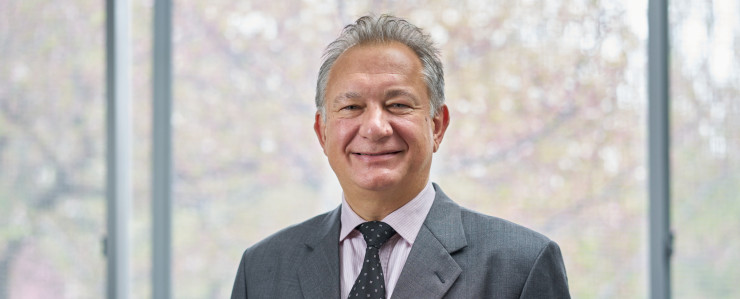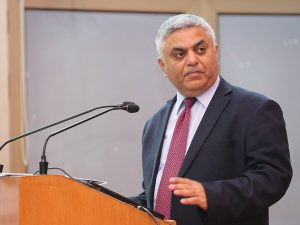
A seasoned diplomat in Bulgaria, New York and London, Senior Legal Expert for the EU project ‘Legal Protection of Individual Rights’ in Russia, Senior Academic Officer, United Nations University, Tokyo, Dr. Vesselin Popovski’s resume is as impressive as it gets. But that’s just the beginning. He has edited and authored over 20 books, is the expert voice on International law, peace and conflict, as well as Hinduism and Buddhism. In his current position as the Vice Dean, Jindal Global Law School (JGLS) and the Executive Director of Centre for the Study of United Nations at Jindal Global University, he molds future professionals and change makers of the world. Here’s looking back at his journey from being a diplomat to an esteemed author to a respected and accomplished academician.
Experiences maketh the man and the diplomat
Like most children growing up in football-loving Bulgaria, Dr. Popovski was crazy about the sport. But as the likes of Hristo Stoichkov were dazzling the world with their goalscoring, the country was also going through a major revolution. The authoritarian Communist regime of over four decades had led to dissent amongst the masses. Solidarność movement in neighboring Poland had also reverberated with the populace. “At the time, my favorite subjects were Mathematics and Physics, but I got attracted by the International events and thereby to diplomacy. I ended up in Institute for International Relations in Moscow where all Bulgarian diplomats went to study. That’s how my stint as a diplomat actually began,” he says.
The lived experiences gave Dr. Popovski a clear and sensitive perspective of International issues. He compares the revolution in Bulgaria to the more recent Arab Spring in Tunisia, Libya, Syria, Egypt. The masses wanted dictators like Gaddafi and Mubarak to leave, and have democracy, human rights, and the rule of law. “The processes are similar, but over time we are also seeing a backlash. For example, under Gorbachev and his reforms, freedom and human rights evolved in Russia. But now President Putin has been in power for 18 years, that is almost as long as some of the Communist regimes,” he says drawing a parallel with subtlety. That’s the thing about diplomats; they say everything they have to, delicately.
An academic evolves, an author expresses
It was while Dr. Popovski was serving as a diplomat in London that he decided to make the switch to academia. He completed his PhD from the prestigious King’s College, London before working as an Assistant Professor at the University of Exeter, UK. According to him, teaching and research can feed off each other, and together they gave birth to the author. Dr. Popovski’s very first book on children’s rights and international criminal accountability got much acclaim. “It was a book on how tribunals from Yugoslavia and Rwanda reflect on the child. Although I had been writing about tribunals since 1991, this book was a success because we managed to bring all top judges and prosecutors into it,” he remembers.

That was in 1996. In over two decades since, Dr. Popovski has authored and edited over 20 books with few others in the pipeline. It’s difficult to pick one from the prolific record, but his 2009 book ‘Norms of War in Cross-Religious Perspective’ remains much talked about. “It was a collaboration with Peace Research Institute, Oslo and I co-authored it with Gregory Reiberg, who is an expert in Christianity. I had the knowledge of Hinduism and Buddhism. In the book we say that religion itself doesn’t cause wars. Conflict is always about power, land, influence, be it Israel-Palestine or India-Pakistan. Religion is a facilitator, powerful manipulator of soldiers, and is used by the State for its gains,” he asserts.
Shattering myths, bridging contexts, building future leaders
Dr. Popovski’s book looked at religions and norms of war, how long did they exist before UN and Geneva conventions. The results were fascinating and broke the myth about conflict norms, resolutions and human rights evolving in the West. According to him, Hinduism through Mahabharata addressed those issues centuries ago – when force is allowed, how to conduct warfare. He calls them “origins of International criminal law”, which also existed in Buddhism and Islam. “It’s interesting that they didn’t start in the West, UK or France. They have their origins in India and Iran. Renaissance in Europe happened much later, so the West is kind of late in this context. We need to realize that Human Rights is not a western concept, they are universal,” he says thoughtfully.

As he teaches International Criminal Law, Public International Law, Human Rights Law at JGLS, Dr. Popovski brings that interesting worldview and experience to the classroom. His students also benefit from his continuous research while he gets to understand the impact of his research through classroom response. Thriving in his engaging relationship in India for the past 4 years he recounts his experience. “Here I see students with passion for global issues and International affairs. They want to develop their careers internationally, and those are the kind of students I work well with. India is important and vast, so sometimes students want to learn about their country first. But in terms of globalization, there is no difference between domestic and international context. This is one place where JGLS is unrivaled because we have faculty from all over the world and students are exposed to diverse experience and expertise,” he concludes. Dr. Popovski himself epitomizes that.


